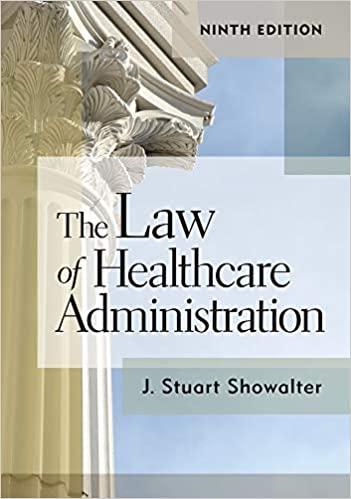Question
Do you agree with this statement about Justice Hugo Black? And why? It is clear to me that justice Hugo Black always recognized the essential
Do you agree with this statement about Justice Hugo Black? And why? It is clear to me that justice Hugo Black always recognized the essential importance of the assistance of counsel in all criminal prosecution cases under the 6th Amendment. As stated in Johnson v. Zerbst, Justice Black recognized the complexity of the legal system and acknowledged the need for legal representation as he pointed out that even the educated and intelligent layman would lack the skills and knowledge to adequately
form a legal defense for himself. As this court decision expanded the right to counsel under the Six Amendment to indigent defendants in all criminal federal trials (Unless a knowing, intelligent, and competent waiver of counsel is evidenced); the question will be constructed from this point on to question if this same guaranteed right would be applicable to the states as well. In Betts v. Brady Warden (N.837, 1942), The Supreme Court of the United States had the opportunity to review this issue; nevertheless, the Supreme Court declined to extend this fundamental fairness due process to the states as it had previously granted to the federal government. Here, Justice Black had the opportunity to reaffirm his views of the Johnson v. Zerbst decision in his dissenting opinion. The Supreme Court explained that the 6th Amendment of the national constitution applies only to the federal courts and therefore the due process clause of the Fourteen Amendment does not incorporate as such found in the 6th Amendment (Hurtado v. California 110 U.S 516). The Supreme Court returned to the special circumstance's clause of the Fourteen Amendment where the right to counsel is only guaranteed if the trial is offensive to the common and fundamental fairness protection ( murder and rape). Justice Black stated that the petitioner in this case was denied the procedural protection under the federal constitution of right to counsel under his specific circumstances and under the nature of his crime. Justice Black stated that the denial of counsel to this indigent defendant in this robbery case is offensive to the common and fundamental ideas of fairness and rights as he believes that the 6th Amendment which already guarantees the right to counsel for all federal cases should be equally applicable to the states under the Fourteen Amendment. He added that the right to counsel in criminal proceedings is a fundamental right that serves as an effective barrier arbitrary or unjust deprivation of liberty by the government (Johnson v. Zerbest). As the historical common law of the right to counsel, Justice Black returned to Powell v. Alabama to underline the inherited dangers of denying adequate counsel in a criminal case. In Powell, the defendants were denied the equal protection under the law under the due process of the Fourteen Amendment. Justice Black essentially returned to his idea of the complexity of criminal trials and the absolute necessity for guidance of a counsel in criminal proceedings for an effective and adequate defense. Furthermore, Justice Black reassured that the lack of counsel can easily result in the conviction of an innocent person and the fundamental ideas of fairness and right would eventually be compromised. A defendant should be represented by legal counsel specially if he is poor and indigent regardless of the criminal charges (capital case or any other case). In regard to allowing the states to decide for themselves when and if the right to counsel is fundamental under the principals of federalism, Justice Black pointed out that most of the states have already demonstrated their willingness to provide counsel to poor indigent defendants in criminal capital murder cases as mandated in Powell v. Alabama. Justice Black essentially is proposing that the general implementation of counsel to all poor defendants in any criminal proceedings would guarantee equal justice under the law and thus promote our democracy. This right would eventually be viewed as essential to the accused, the Court and the public. In other words, the implementation to the right to counsel would be a benefit to society because it is a universal necessity and therefore, not an inconvenience to the states (not an imposition by the federal government). In my view, Justice Black was deeply concerned with the wrongful conviction of innocent criminal defendants. Aside from his strong commitment to the belief that the due process clause of the Fourteen Amendment also applied to the states, it is highly probable that Justice Black also believed that the lack of counsel in any criminal proceedings would eventually increase the chances of wrongful convictions. In his decisions, he described criminal proceeding as a complex concept that was confusing in nature to the average man. Thus, Justice Black believed that an average man could not be capable of creating an adequate legal defense for himself. Justice Black recognized that the right to counsel was not a privilege in nature but a fundamental right. In Justice Black's view, this fundamental right of the 6th Amendment was already guaranteed to everyone through the Fourteen Amendment and it needed to be implemented to the state to assure fairness and justice.
Step by Step Solution
There are 3 Steps involved in it
Step: 1

Get Instant Access to Expert-Tailored Solutions
See step-by-step solutions with expert insights and AI powered tools for academic success
Step: 2

Step: 3

Ace Your Homework with AI
Get the answers you need in no time with our AI-driven, step-by-step assistance
Get Started


